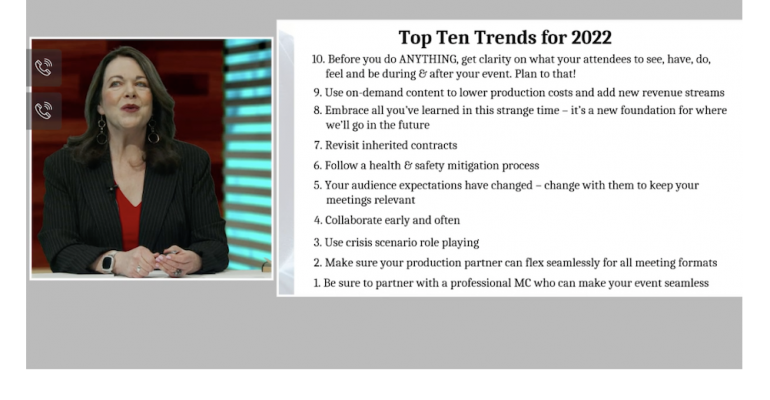With the uncertainty around in-person meetings now approaching the two-year mark, planners of business events are forced to have not just a plan A but also a plan B and plan C to make sure they can execute events that meet their stakeholders’ objectives. That’s a nearly overwhelming task.
To help planners approach their 2022 planning, four longtime event-coordination professionals bounced ideas off each other during a one-hour MeetingsNet webinar titled “Lessons from the Experts for 2022.” Here are three smart suggestions from that session:
• “Parallel planning” should take place from the moment that a meeting is green-lighted, says Simon Melser of Image Audiovisuals. This means planning different experiences for the in-person audience and the virtual audience, which involves decisions such as whether to livestream all sessions, livestream only main-stage sessions, or record all sessions and broadcast them days or weeks after the live event (known as an asynchronous hybrid meeting). Having separate emcees as well as separate avenues for attendee interaction for each audience is also necessary. And if the in-person audience must convert to virtual due to Covid regulations or fears in a host destination, this parallel planning makes the shift easier to do on short notice.
• Ask enough questions to determine whether the host property, the audiovisual provider, and other suppliers will be simply a service provider or a true partner in the event’s planning and execution, says Jennifer Haisten, CMP, of GlobeauxSource. With those suppliers you determine will act as your partner, don’t be afraid to share an approximate budget so that you’ll understand all the possibilities for each event element—including some possibilities you might not even know about.
• Brainstorm possible crisis situations and conduct simulations to get the response right for each possibility, says Brenda Rivers of SAFE LLC Event Management. The host property and audiovisual company must be involved in this so that neither your emergency playbook nor your crisis-communication plan has any holes.
The MeetingsNet webinar is available for on-demand viewing here.





